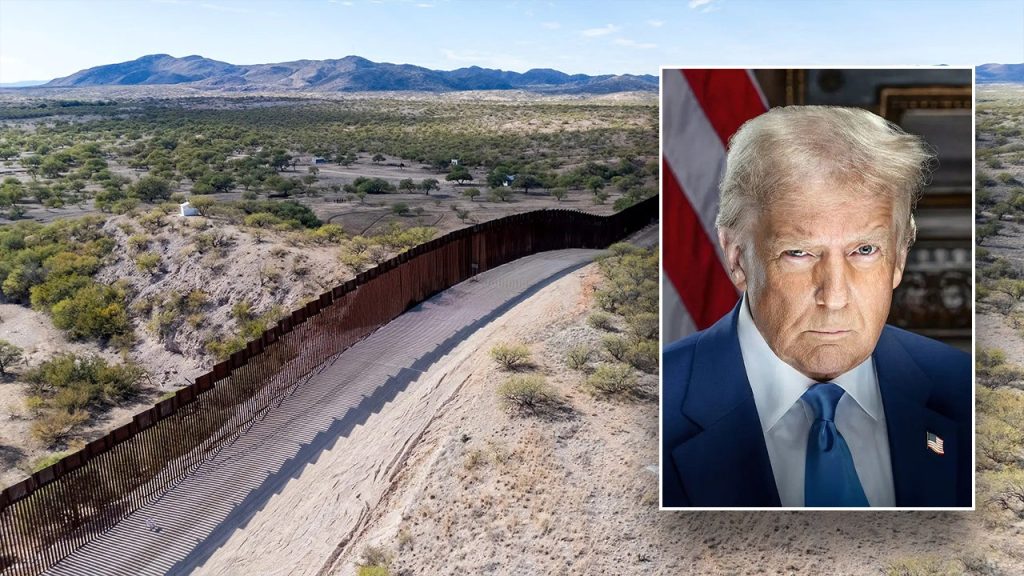In a significant move against narco-terrorism, the U.S. Department of the Treasury has announced new sanctions targeting two high-ranking members of the Cartel del Noreste (CDN), a notorious criminal group linked to violence along the southern border. These sanctions, which were implemented as a direct response to the increasing threats posed by CDN, aim to dismantle its operations and hold accountable those responsible for gross violations of human rights. Local border officials have voiced their support for these measures, emphasizing the ongoing risks that such cartels pose to communities on both sides of the border.
| Article Subheadings |
|---|
| 1) Overview of the Sanctions |
| 2) Impacts of the Sanctions |
| 3) Voices from the Border Community |
| 4) The Cartel’s Activities and Operations |
| 5) Future Implications of the Sanctions |
Overview of the Sanctions
The latest measures from the U.S. Treasury Department specifically target two individuals, Miguel Angel de Anda Ledezma and Ricardo Gonzalez Sauceda, who are high-ranking members of the Cartel del Noreste (CDN). Announced on a Wednesday, this sanctioning follows the designation of CDN as a “foreign terrorist organization” by the U.S. Department of State on February 20. Under the new regulations, all property and financial interests of these individuals within the United States are now blocked, effectively cutting off resources that the cartel may use for criminal activities. This marks a strategic pivot in U.S. policy aimed at crippling the operational capacity of such cartels, recognized as significant threats to national security.
Impacts of the Sanctions
The sanctions are expected to have a widespread impact on the operations of CDN. Treasury Secretary Scott Bessent emphasized the urgency of these actions, stating the department is “working toward the total elimination of cartels to make America safe again”. He pointed out that by targeting leaders within these organizations, the U.S. government aims to disrupt existing trafficking networks and deter future criminal activities. The ultimate goal of these sanctions is not just to punish individuals but to create significant disruptions within the cartel hierarchy, inducing competition and chaos that could lead to further fragmentation of their operations.
Voices from the Border Community
Local authorities in areas affected by cartel violence have expressed strong support for the sanctions. Paul Perez, who leads the National Border Patrol Council chapter in the South Texas Rio Grande Valley, commented on the ongoing threat that cartels, including CDN, continue to pose. Despite the Trump administration’s previous successes in reducing illegal crossings, Perez noted that the sophisticated nature of cartel operations, including the use of advanced technology like drones, remains a significant challenge. He reiterated the urgency of controlling cartel activities, underscoring that, “The threat of cartels is still there,” and highlighted the fear of retaliatory violence from cartel operatives targeting residents in border communities.
The Cartel’s Activities and Operations
The CDN is notorious for its violent reputation and its involvement in various criminal enterprises, primarily drug trafficking, including the distribution of fentanyl. Reports indicate that CDN engages in horrifying acts including kidnappings and beheadings, allowing them to instill fear not only within communities but also in law enforcement agencies. Information from local sources reveals that these cartels operate with relative impunity in Mexico, significantly complicating efforts to interdict their operations. The cartel is described as well-organized and capable of adapting their tactics quickly, which poses a persistent challenge for authorities both locally and nationally.
Future Implications of the Sanctions
As the U.S. government intensifies its efforts against CDN and similar organizations, the implications of such sanctions could lead to significant shifts in cartel dynamics. Experts believe that targeting leadership figures may not just weaken the cartel’s influence but could spur internal conflicts as rival factions vie for control. With a possible power vacuum formed, this situation could result in more violent confrontations, not only among cartel groups but also impacting border communities. Continued vigilance and resource allocation by law enforcement agencies will be necessary to navigate this turbulent landscape, ensuring safety for those affected by cartel activities.
| No. | Key Points |
|---|---|
| 1 | The U.S. Treasury has sanctioned two CDN leaders to combat cartel activities. |
| 2 | These sanctions aim to diminish the cartel’s capacity to operate within the United States. |
| 3 | Local officials support the sanctions, emphasizing ongoing threats from cartels. |
| 4 | The CDN generates violence through activities like trafficking and intimidation. |
| 5 | Future impacts may include internal strife within the cartel as leadership is disrupted. |
Summary
The recent sanctions against the leaders of Cartel del Noreste underscore a continuing commitment from U.S. authorities to combat cartel violence and drug trafficking at the southern border. By targeting key figures in these organizations, the government seeks to destabilize operations that have long endangered both American citizens and border communities. As local officials rally for stronger enforcement and support these measures, the future effectiveness of such sanctions will depend on a coordinated approach to dismantling the intricate networks that empower these criminal enterprises.
Frequently Asked Questions
Question: What is the purpose of the new sanctions against CDN?
The sanctions aim to cut off resources to the cartel by blocking any U.S. assets of its leaders, ultimately hampering their operational capabilities.
Question: Who are the individuals targeted by these sanctions?
The sanctions specifically target Miguel Angel de Anda Ledezma and Ricardo Gonzalez Sauceda, both high-ranking members of the Cartel del Noreste.
Question: How do these sanctions affect local communities?
Local communities continue to face threats from cartel violence, and the sanctions may escalate tensions within the cartel, potentially leading to increased violence as factions fight for control.
